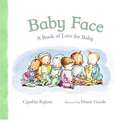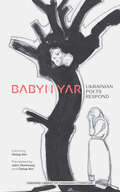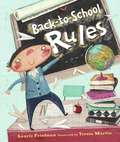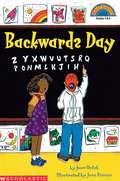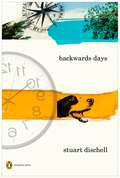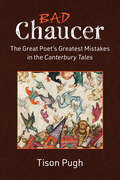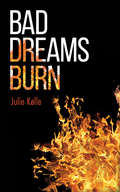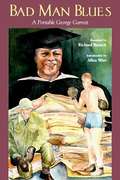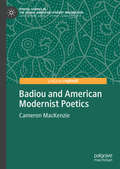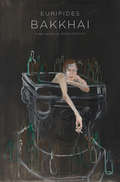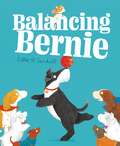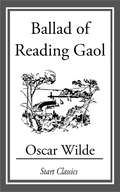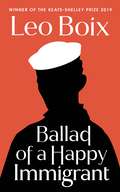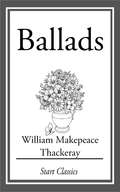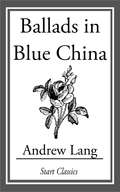- Table View
- List View
Baby Face: A Book of Love for Baby
by Cynthia RylantBaby lovely, Baby sweet, Baby so divine. I love your pretty baby face. Tell me you are mine. From the early morning of a new day to afternoon nap time to the evening bath and bedtime, a baby's life is sometimes quiet, sometimes busy, and always filled with baby love. Newbery Medal recipient Cynthia Rylant and beloved artist Diane Goode joyfully celebrate all of the treasured moments in a baby's life in six read-aloud verses for babies and toddlers to share -- especially with those they love.
Baby's Boat
by Jeanne TitheringtonDescribes a baby falling asleep while sailing out in a silver moon boat.
Baby's First Bedtime Songs (Baby's First)
by Jennifer MillerBabies will love to hear these favorite lullabies. Rock-a-Bye, Baby Sleep, Baby, Sleep Twinkle, Twinkle, Little Star Brahms' Lullaby
Babyn Yar: Ukrainian Poets Respond (Harvard Library of Ukrainian Literature #4)
by Ostap KinIn 2021, the world commemorates the 80th anniversary of the massacres of Jews at Babyn Yar. The present collection brings together for the first time the responses to the tragic events of September 1941 by Ukrainian Jewish and non-Jewish poets of the Soviet and post-Soviet periods, presented here in the original and in English translation by Ostap Kin and John Hennessy. Written between 1941 and 2018 by over twenty poets, these poems belong to different literary canons, traditions, and time frames, while their authors come from several generations. Together, the poems in Babyn Yar: Ukrainian Poets Respond create a language capable of portraying the suffering and destruction of the Ukrainian Jewish population during the Holocaust as well as other peoples murdered at the site.
Back-to-school Rules
by Laurie Friedman Teresa MurfinWhen it comes to surviving school, Percy's at the head of the class. If you can follow his ten simple rules, making the grade will be a piece of cake (and school will be a lot of fun).
Backwards Day
by Joan HolubEverything in school is reversed on backwards day, from reading books back to front to saying "no" instead of "yes".
Backwards Days
by Stuart DischellAnother set of antidotal lyrics and story-poems from Stuart Dischell <P> Sly, comic, inventive, and exuberant, the brokenhearted lyrics and dark parables of Backwards Days are cast in the spirit and craft Stuart Dischell's poetry is known for. In this, his fourth full-length collection, he revs up both music and experience and writes startling poems of emotional intensity that chronicle the restlessness of desire. Sometimes grim, ever buoyant and hopeful, even in the most sorrowful or macabre situations, the poems of Backwards Days are most particularly about the movement of time, physical movement, and the movement of the heart. Through landscapes both real and of the psyche, they live on the edge of an elusive understanding never quite gotten right.
Bad Chaucer: The Great Poet’s Greatest Mistakes in the Canterbury Tales
by Tison PughAcclaimed for centuries as the “Father of English Literature,” Geoffrey Chaucer enjoys widespread and effusive praise for his classic Canterbury Tales—and rightfully so. Still, even the greatest of authors cannot claim perfection, and so Bad Chaucer: The Great Poet’s Greatest Mistakes in the Canterbury Tales analyzes his various missteps, missed opportunities, and other blunders in this peerless masterpiece. From a vexing catalog of trees in the Knight’s Tale to the flirtations with blasphemy in the Parson’s Tale, this volume progresses through the Canterbury Tales story by story, tale by tale, pondering the most egregious failing of each in turn. Viewed collectively, Chaucer’s troubles stem from clashing genres that disrupt interpretive clarity, themeless themes that undermine any message a tale might convey, mischaracterized characters who act without clear motivation, purposeful and otherwise pleasureful badness that show Chaucer’s appreciation for the humor of bad literature, and outmoded perspectives that threaten to alienate modern readers. Badness is not always to be lamented but often celebrated, even cherished, for badness infuses artistic creations with the vitality that springs from varied responses, spirited engagements, and the inherent volatility of enjoying literature. On the whole, Bad Chaucer: The Great Poet’s Greatest Mistakes in the Canterbury Tales swerves literary criticism in a new direction by examining the provocative question, for too long overlooked, of what this great author got wrong.
Bad Dreams Burn
by Julie KølleThis is a collection of my blood spilled intentionally inside these pages. I think it has dried by now. I hope it has so you can use these pages to start a fire and make bad dreams burn.
Bad Man Blues: A Portable George Garrett
by George P. GarrettA new collection of stories, anecdotes, and personal essays, with a few poems added for good measure, by the writer whose first collection of short fiction was published to high praise some 40 years ago.
Badiou and American Modernist Poetics (Pivotal Studies In The Global American Literary Imagination Ser.)
by Cameron MacKenzieBadiou and American Modernist Poetics explores the correspondence between Alain Badiou's thinking on art and that of the canonical modernists T.S. Eliot, Wallace Stevens, and Ezra Pound. Utilizing a multidisciplinary approach, the text engages with themes of the void, mastery, and place present in both modernist poetry and in Badiou’s philosophy. Through an examination of classic modernist texts, Cameron MacKenzie reveals that where Badiou hopes to go, the modernists have already been.
Badlat Geleli Sahi FYBA - SPPU: बदलत गेलेली सही एफ.वाय.बी.ए. - सावित्रीबाई फुले पुणे यूनिवर्सिटी
by Anjali Kulkarniसही म्हणजे स्वओळख. 'बदलत गेलेली सही' हा कवितासंग्रह म्हणजे माणसांच्या, हरवत चाललेल्या स्वओळखीच्या शोधाचा प्रवास. एका बाजूला माणसांच्या जगण्याभोवती गरगरणारा आधुनिक काळातला, जागतिकीकरण, संगणकीकरण, युद्धखोरी आणि बाजारीकरणाचा भोवरा, त्यात हरवून गेलेली माणसाची व्यक्तीविशिष्टता, ऐहिक लोलुपतेच्या एकाच साच्यातून जगणाऱ्या माणसांचे यांत्रिकीकरण, त्याचे ताणतणाव आणि दुसऱ्या बाजूला यासकट आणि याशिवाय पुरुषी सनातनत्वाचे चटके-फटके सोसणारी, तरीही स्वतःची ओळख शोधू-जपू मागणारी स्त्री. नात्यांचे ताणतणाव पेलणारी सारं जग एका थक्क करणाऱ्या ऐहिक विकासाच्या परमोच्च बिंदूवर गतीमानतेनं पोचत असताना, जुन्याच परिघावर अडखळून उभी असलेली. अद्याप चेहराच न मिळालेली. अंजली कुलकर्णी यांनी या आधुनिक काळात वावरणाऱ्या माणसांच्या आणि विशेषकरून स्त्रीच्या दुखःची दुखरी नस नेमकेपणानं पकडली आहे. एकाच वेळी एकतानता आणि आलीप्तता, खोल विचारशीलता आणि उत्कट भावनाशीलता यांनी या कवितेच्या पैठणीवस्त्राला झळझळीत फिरता रंग बहाल केला आहे.
Baghdad: The City in Verse
by Roger Allen Reuven Snir Abdul Kader El JanabiBaghdad: The City in Verse captures the essence of life lived in one of the world's great enduring metropolises. In this unusual anthology, Reuven Snir offers original translations of more than 170 Arabic poems--most of them appearing for the first time in English--which represent a cross-section of genres and styles from the time of Baghdad's founding in the eighth century to the present day. The diversity of the fabled city is reflected in the Bedouin, Muslim, Christian, Kurdish, and Jewish poets featured here, including writers of great renown and others whose work has survived but whose names are lost to history. Through the prism of these poems, readers glimpse many different Baghdads: the city built on ancient Sumerian ruins, the epicenter of Arab culture and Islam's Golden Age under the enlightened rule of Harun al-Rashid, the bombed-out capital of Saddam Hussein's fallen regime, the American occupation, and life in a new but unstable Iraq. With poets as our guides, we visit bazaars, gardens, wine parties, love scenes (worldly and mystical), brothels, prisons, and palaces. Startling contrasts emerge as the day-to-day cacophony of urban life is juxtaposed with eternal cycles of the Tigris, and hellish winds, mosquitoes, rain, floods, snow, and earthquakes are accompanied by somber reflections on invasions and other catastrophes. Documenting the city's 1,250-year history, Baghdad: The City in Verse shows why poetry has been aptly called the public register of the Arabs.
Baita hondakinak ere
by Iñigo AstizBaita hondakinak ere, Iñigo Astiz: Ez dakit nor den, baina norbaitek denbora bat kalkulatu dit hemen. Eskaileretako argiari sakatu eta bertan gelditu naiz ikustera noiz suposatzen nauten kanpoan, noiz behar nukeen beste inon, agian beste inorekin, edo behintzat ez hemen: bakarrik, geldi, isilik. Ezertan ez. Bataz besteko presentzia bat dut munduaren leku zehatz honetan, eta nire ausazko existentziaren denbora agortzea erabaki dut gaur, beste inori eszedenterik utzi gabe. Norentzat dira nire segundoak ni ez nagoenean? Ordezkatzen al naute? Bigarrenez sakatu diot argiari, geldi, ezin asmatuz zer beste unerengatik sakrifikatu behar nukeen une hau, zer beste lekutan pentsatu nauten, eta zer beste bizitza amestu didaten.
Bakkhai
by Anne Carson EuripidesA stunning, new translation by the poet and classicist Anne Carson, first performed in 2015 at the Almeida Theatre in London Anne Carson writes, “Euripides was a playwright of the fifth century BC who reinvented Greek tragedy, setting it on a path that leads straight to reality TV. His plays broke all the rules, upended convention and outraged conservative critics. The Bakkhai is his most subversive play, telling the story of a man who cannot admit he would rather live in the skin of a woman, and a god who seems to combine all sexualities into a single ruinous demand for adoration. Dionysos is the god of intoxication. Once you fall under his influence, there is no telling where you will end up.”
Balancing Bernie
by Ellie SandallBernie is a dog with a very special talent - he can balance absolutely anything! One day he gets a very unusual request from a furry friend - can Bernie balance this little dog, too? Soon, dogs from all over the park are hurrying up with a woof and a bark to join in Bernie's brilliant balancing act! But don't worry, Bernie would NEVER let them all fall . . .A playful, bouncing read-aloud story, full of dogs of all shapes and sizes, from the creator of the Everybunny series!
Ballad of Reading Gaol
by Oscar WildeOscar Fingal O'Flahertie Wills Wilde was an Irish playwright, poet and author of numerous short stories and one novel. Known for his biting wit, and a plentitude of aphorisms, he became one of the most successful playwrights of the late Victorian era in London, and one of the greatest celebrities of his day. Several of his plays continue to be widely performed, especially The Importance of Being Earnest.
Ballad of a Happy Immigrant
by Leo Boix'It isn't often that one encounters a sensibility so interested in our world - and so compelling in its powers of attentiveness. Leo Boix's poetry has a wide tilt and scope. It sings the doors open' Ilya Kaminsky, author of Deaf Republic'They are sailors from another century, stalwart / captured on daguerrotype, casually masculine, tender of heart.'In the middle of the last century, the SS General Pueyrredón from Buenos Aires deposits Leo Boix's paternal grandfather on English soil for the first time. In the two years he spends there, he acquires a taste for his new homeland: from taking his tea white - muy blanco - to plunging into unfamiliar sensual worlds.So begins the poet's own journey, arriving in the United Kingdom as a young queer man. Ballad of a Happy Immigrant tells of the life he makes there: a dazzling collection of what it means to live, love and write between two cultures and traditions. Effortlessly moving between the English imagination and Spanish language, it is a boundless exploration of otherness and home, and the personal transformation that follows between 'loss / and a life / that starts anew.'*A Poetry Book Society Wild Card Choice*
Ballads
by William Makepeace ThackerayWilliam Makepeace Thackeray (1811-1863) was an English novelist of the 19th century. He was famous for his satirical works, particularly Vanity Fair (1847), a panoramic portrait of English society. Thackeray began as a satirist and parodist, with a sneaking fondness for roguish upstarts like Becky Sharp in Vanity Fair, Barry Lyndon in Barry Lyndon (1844) and Catherine in Catherine (1839). In his earliest works, writing under such pseudonyms as Charles James Yellowplush, Michael Angelo Titmarsh and George Savage Fitz-Boodle, he tended towards the savage in his attacks on high society, military prowess, the institution of marriage and hypocrisy. His writing career really began with a series of satirical sketches now usually known as The Yellowplush Papers, which appeared in Fraser's Magazine beginning in 1837. Between May 1839 and February 1840, Fraser's published the work sometimes considered Thackeray's first novel, Catherine also notable among the later novels are The Fitz-Boodle Papers (1842), Men's Wives (1842), The History of Pendennis (1848), The History of Henry Esmond, Esq., (1852), The Newcomes (1853) and The Rose and the Ring (1855) .
Ballads in Blue China
by Andrew LangAndrew Lang (1844-1912) was a prolific Scots man of letters, a poet, novelist, literary critic and contributor to anthropology. He now is best known as the collector of folk and fairy tales. He was educated at the Edinburgh Academy, St Andrews University and at Balliol College, Oxford. As a journalist, poet, critic and historian, he soon made a reputation as one of the ablest and most versatile writers of the day. Lang was one of the founders of the study of "Psychical Research," and his other writings on anthropology include The Book of Dreams and Ghosts (1897), Magic and Religion (1901) and The Secret of the Totem (1905). He was a Homeric scholar of conservative views. Other works include Homer and the Epic (1893); a prose translation of The Homeric Hymns (1899), with literary and mythological essays in which he draws parallels between Greek myths and other mythologies; and Homer and his Age (1906). He also wrote Ballades in Blue China (1880) and Rhymes la Mode (1884).
